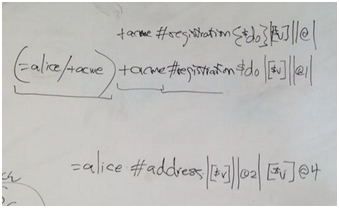The minutes note that
"We did not have time to discuss these other open topics: I've thought about the topic of "deferred connection requests." In our analysis of link contract (LC) instantiation, or connections, we haven't found a protocol issue with the deferred processing of a connection request (CR). The XDI message protocol is stateless and waits.
As an implementation issue, there might some cleanup required for deferred connection requests that are never completed, or are completed after the requesting party no longer cares about the connection. We could put something like this into the eventual spec.
"RAs MAY track connection requests and, if no expected response is received within a desired time period, clean up any connection subgraph entries recording the requests and remove any requestor link contracts or other data originally pre-positioned for the connection."
The only un-graceful result I can see from a connection request timing out on the RA side is that both sides will contain data about connections and link contracts they will now never use. The AA may try to write an LC instance to a requestor LC; that write could fail if the RA has cleaned up the detritus of unprocessed connection requests and AA's behavior is indeterminate then. We need to look at that when we work on requestor LC issues.
Another think we could do would be to require or recommend specifying temporal data in link contract templates, link contract instances and connection requests. So that every LC instance and template, and every CR and CI have an $add$t for its creation date. CRs and CIs could also have an $expires$t that would cause them to be dropped out of all subgraphs during houskeeping.
Template versioning
Here are some notes from the deep dive we had in Berkeley last month.
Discussion of versions of templates
+acme#registration[$v]@...
+acme<#tel>[<$v]@
Note: the $v needs to be extensible to the major/minor
pattern, but you can do that through [$v]@[$v]@
Note for TC: the XDI versioning spec may need to be put on
the critical path, too complex to go in the dictionary

Figure above shows the potential use of version with both
the link contract template and the link contract instance
Best regards,
Dan
